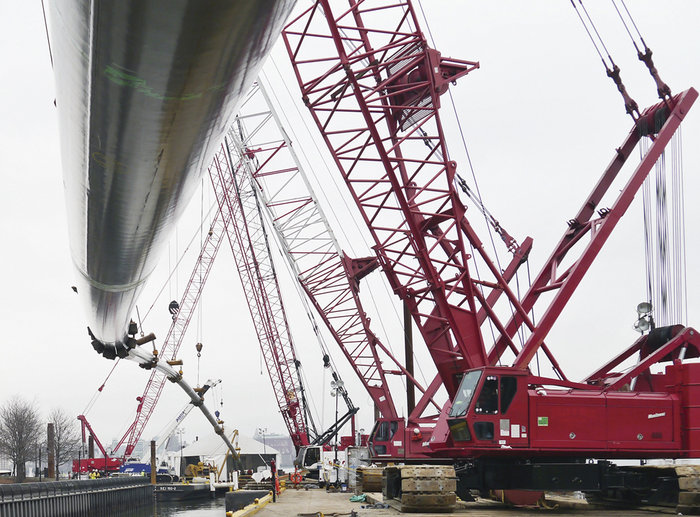Construction on Spectra Energy’s high pressure natural gas pipeline is within months of completion, according to the engineers’ union doing most of the work on this controversial project. In fact, by the time attorneys for Jersey City filed a lawsuit in federal court last month to halt construction, engineers had already transported, assembled, and laid 5,400 feet of pipeline that now spans the entire Hudson River from Jersey City to Manhattan.
Almost 140 members of the International Union of Operating Engineers (IUOE) worked around the clock for 48 hours straight during the first weekend in December to complete the trans-Hudson portion of the project.
Less than two weeks later, on Dec. 12, attorneys representing Jersey City and various environmental and community groups filed a Petition for Review with the U.S. Court of Appeals in Washington, D.C. The petition asks the court to review the federal approval process that allowed the pipeline to be built.
Jersey City has fought the against Spectra Energy’s natural gas pipeline for years, arguing that the pipeline’s route through residential neighborhoods and transit infrastructure could endanger the lives of thousands of residents if there were a natural gas explosion. The city pushed unsuccessfully to have the pipeline routed entirely under the Hudson River.
“The pipeline will be operational this November.” – Spectra spokeswoman Marylee Hanley
____________
Caravan of pipe down 18th Street
Construction of the trans-Hudson portion of the pipeline was a massive undertaking – but one that was done quickly and with precision.
For two days 18th Street, near the Jersey City-Hoboken border, was partially shut down as 15 sidebooms inched 40-foot lengths of pipe towards the waterfront near Newport Green and the Hudson-Bergen Light Rail’s Hoboken station.
As these sections of pipe got close to the waterfront, six cranes were used to lift the pipe into position so they could be welded into 1,000-foot lengths of pipe.
“Each weld took about three hours,” said Bill Carlos, spokesman for Local 825 of the IUOE. “They then had to X-Ray the weld, to make sure it was solid. The welded areas were also coated with something that [guards against] corrosion.”
“Using a high-powered drill, engineers bore under the Hudson River,” Carlos continued. “When the drill reached the Jersey City side of the river, a 1,000-foot length of pipe was attached to the drill head. The drill head was then pulled back towards Manhattan. Periodically, new 1,000-foot lengths of pipe were welded to the pipe attached to the drill head. They then fed each piece of 1,000-foot pipe into the Hudson River and the pipe was pulled back from Manhattan. They call this exercise a pullback. The drill is pulled back to Manhattan and it drags the pipe with it. The total pull was 5,400 feet, which is more than a mile.”
About 100 engineers who worked over the two days it took to complete this portion of construction came from Local 825, which represents operating engineers in New Jersey and five counties in New York State. Approximately another 36 IUOE members from as far away as California, Massachusetts, Minnesota, Missouri, Texas, Virginia, Oklahoma, Mississippi, Wisconsin, and Illinois were brought in to assist.
‘Operational’ by November
Most of the natural gas that is to be transported through the pipeline will be used to meet the energy needs of Con Edison customers in New York. For years Spectra Energy, which owns and will operate the pipeline, has promised Con Ed that the project would be completed by November 2013, a deadline the company expects to meet.
“The construction of the New Jersey-New York Expansion Project is well underway, and the pipeline will be operational this November,” Spectra spokeswoman Marylee Hanley said last week.
How the rapid progression of the pipeline might affect the city’s lawsuit, if at all, remains to be seen. For the time being, city officials appear not to be worried.
“It does not – and should not – matter,” said Associate Corporate Counsel Derek Fanciullo. “Were we to win in court, the court would put in place mechanisms to stop the pipeline. Will it force Spectra to rip everything up? Maybe not. But, it will stop Spectra from doing any more [construction] and make sure Spectra can’t operate the pipe.”
For more than two years, Mayor Jerramiah T. Healy and the city have argued that this pipeline, which is about 30 inches in diameter and will have a possible pressure of 1,200 pounds per square inch, is the first of its magnitude to be built in a densely-populated urban area near several transit hubs such as the Holland Tunnel, the New Jersey Turnpike, and the Hoboken NJ Transit and PATH terminals.
After the Federal Energy Regulatory Commission (FERC) approved Spectra Energy’s pipeline project last May, Jersey City filed an appeal asking the agency to reconsider. This appeal was denied and the city filed its Petition for Review in December.
In its petition the city argues that since FERC’s annual budget comes from fees it collects from the energy industry it regulates, its decisions are biased in favor of that industry and do not adequately protect communities like Jersey City from problems that may arise from natural gas pipelines and other energy-related infrastructure.
E-mail E. Assata Wright at awright@hudsonreporter.com.
